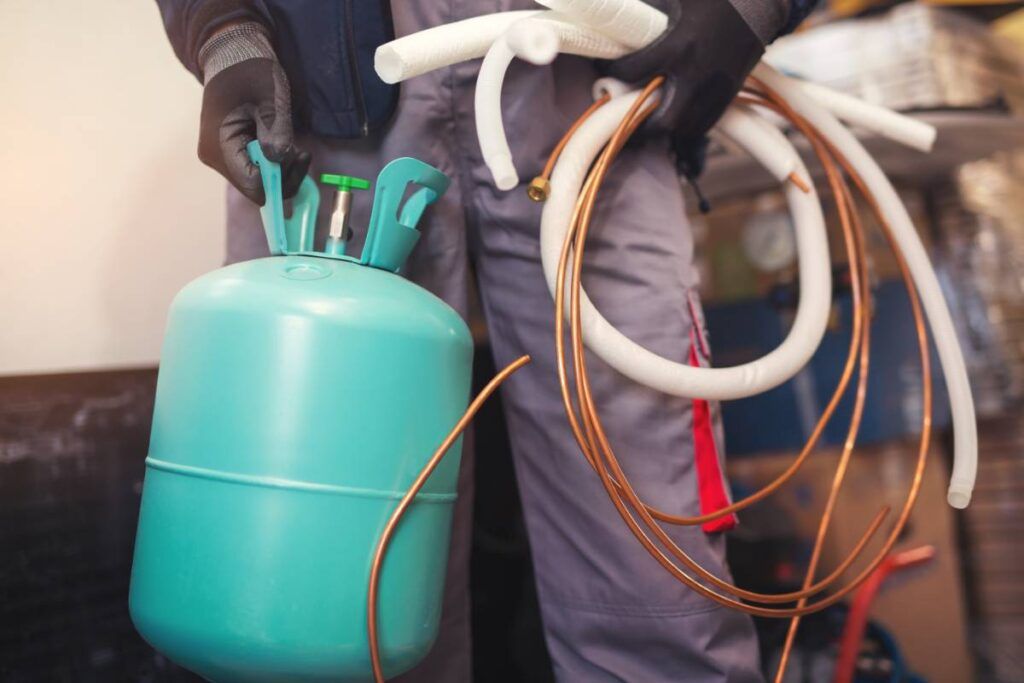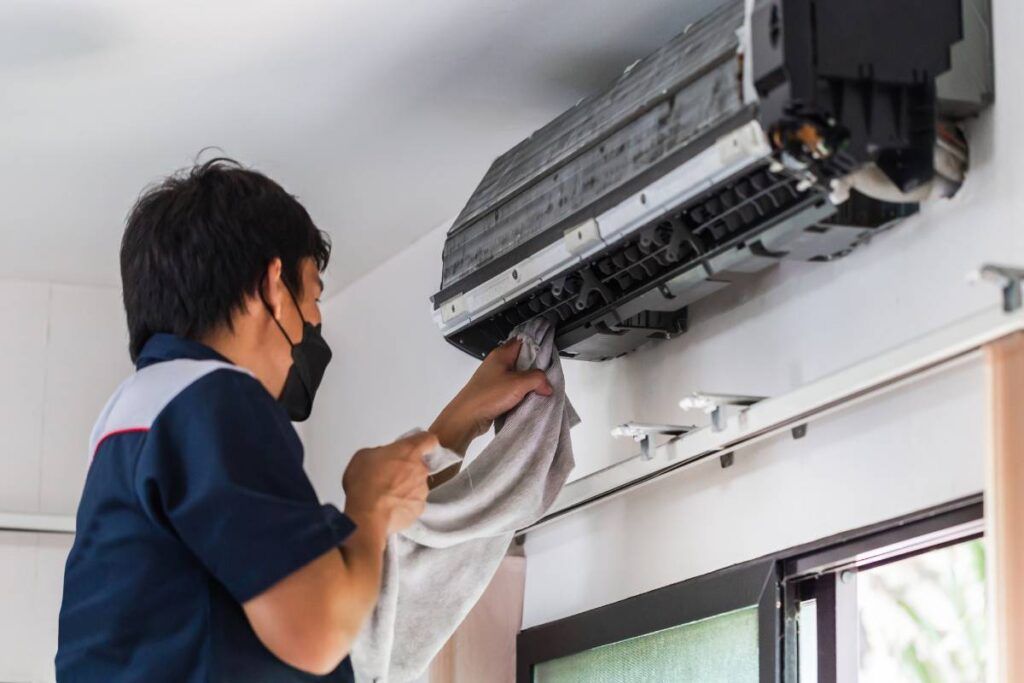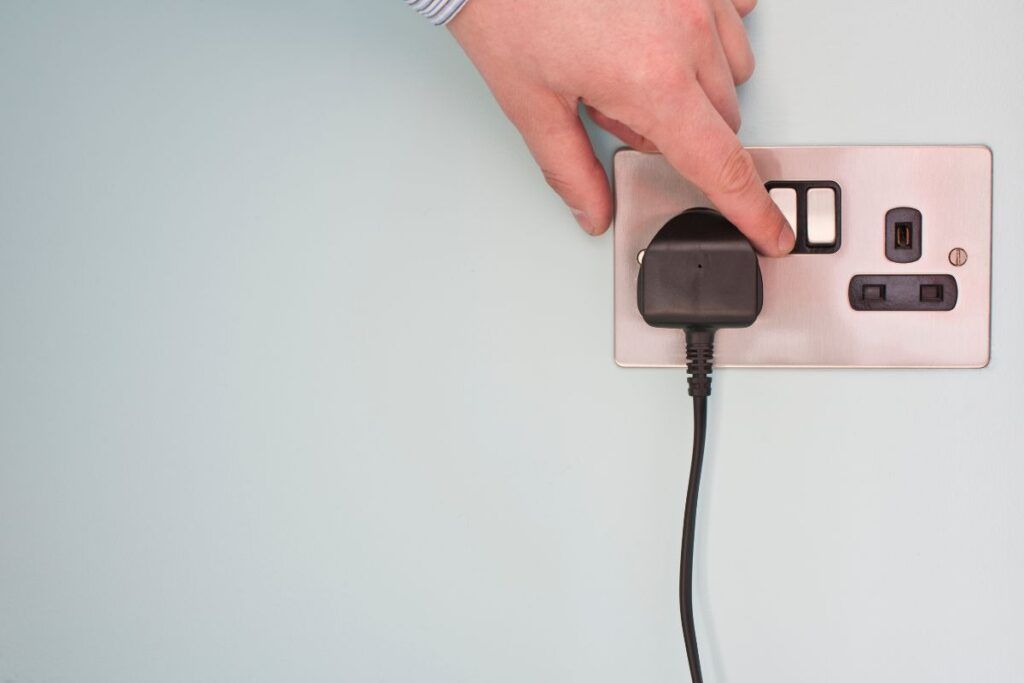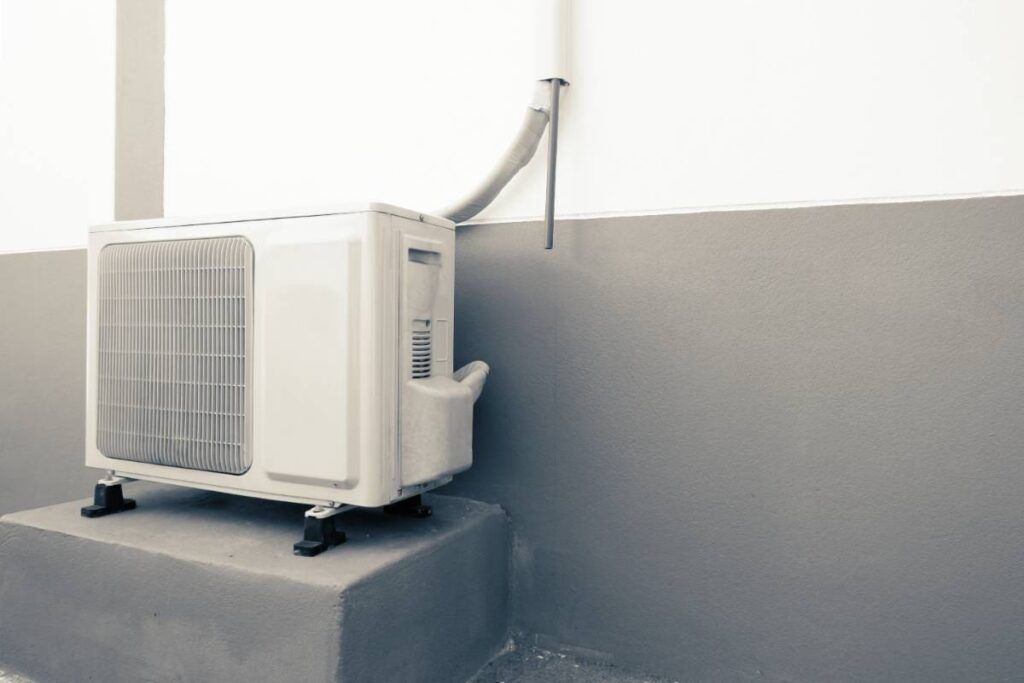Air conditioners are a great savior during the hot and humid summers. But sometimes, you will get a very bad smell in your room after a few moments whenever you turn on the air conditioner. It is frustrating and annoying when you can’t use it when you need it badly.
An air conditioner smells bad due to many factors like clogged air filters or drain lines, malfunctioning circuit boards, gas leakages, animal infestation, or fungus growth. To fix it, clean the drain lines, air filters, and evaporator coils and install an HVAC air purifier.
The common types of smell could be musty, burning, stinky, or rotten carcasses or eggs. Different smells indicate different issues. This article will discuss these different smell types, what each indicates, and how to fix the problem.

Check out our list of top-handpicked products for all your electrical, appliance, and HVAC system needs to keep your home running smoothly.
This post includes some affiliate links.Why does my air conditioner release bad smells?
An air conditioner is an important part of our lives, and it is one of the most used appliances in the house.
That is why the device will require attention whenever it starts releasing a bad smell.
Some smells are toxic and need immediate attention; otherwise, there could be serious health hazards.
The type of smell specifies the problem behind a smelly air conditioner.
It is good that the unit gives us signs through the smell that something is wrong with it.
Air conditioners can produce different types of smells, for example:
- Gunpowder or burning odors
- Stinky, dirty socks odor
- Rotten egg or a sulfur smell
- Decaying smell
- Vinegar smell
- Chemical smell
- Musty smell
- Cigarette smoking smell
Some common reasons could be:
- Refrigerant leak
- Natural gas leak
- Dirty air filter
- Clogged condensate or excess condensation
- Broken capacitor or fan belt
- Mold growth in the evaporator coil
- Dead critters inside the unit
It is the type of smell that tells us the exact reasons.
Sometimes, one smell type could mean multiple things.
For example, a vinegar-like smell could mean a dirty filter, clogged condensate, or mold.
Let’s get to the reasons one by one.
1. Refrigerant leak

You must pay attention if your air conditioner smells like chemicals or paint thinners.
Your air conditioner will depend on this gas to shift the heat through the copper coils from the atmosphere and send it outside the house.
That is how your house cools down.
The freon, or the refrigerant, moves through a closed system in the condenser, evaporator coil, and lines.
These lines are made of copper and can break and leak over time.
Besides the chemical-like smell, you will hear a hissing sound, see ice crystals on the evaporator coil, have no chilling temperatures, or have high energy bills.
Fixing a refrigerant leak will need expert help from the HVAC team.
The professional will find out the main cause behind the leak and fix it before recharging your AC with the refrigerant.
The repair could cost around $225 to $1,600 nationwide.
The actual cost depends on your location.
Air conditioners installed before 2010 run on the R-22 Freon refrigerant, which is no longer manufactured due to the ill effects of the ozone layer.
The repair cost could be expensive.
2. Natural gas leak

Your air conditioner will have a natural gas leak if there is a bad, rotten egg, sulfur-like, skunk spray smell every time you turn it on.
Natural gas has a sulfur-like additive that alarms you when there is a leak.
These gasses could be very dangerous and deadly.
Natural gas does not have any smell of its own.
But gas distributors use Methyl Mercaptan inside the unit to provide a distinctive odor as an alarm to ensure that the problem is gas leakage and needs immediate attention.
Low-level gas leakage might not harm you, but a high level of leakage will reduce the oxygen in your blood, make you unconscious, and even kill you.
If your air conditioner has a natural gas leak:
- Switch off the gas supply.
- Open the windows of the room.
- Leave your house for a few hours.
- Contact your gas company so that they can fix it.
You need an expert’s help in dealing with such problems.
3. Recent ductwork

Sometimes, your air conditioner will release chemical odors similar to glue.
If you have done any recent ductwork, your unit may release a chemical or glue-like smell.
The glue used produces heavy chemicals when they dry out.
So it won’t fade immediately.
Wait for the glue to dry out completely and the smell to fade.
Keep your air conditioner fan off, open the windows and doors of the house, and wait for the smell to get out.
If there is still a chemical smell in your house, you must call your local HVAC contractor and discuss the solution.
4. Mold, mildew, and bacteria

If your air conditioner smells like dirty socks and stinks, the evaporator coil is filled with mold, mildew, and bacteria.
Over time, the evaporator coil will have a buildup of dirt and debris and block it.
The dirt further stops the air from flowing freely and makes it harder for the unit to cool down the rooms.
The dirt will start decomposing and will have a mold and mildew buildup, releasing a foul smell.
Get these dirty evaporator coils cleaned by professionals.
The smell is also called dirty sock syndrome.
The syndrome is generally experienced in climates where you use the heat at night and morning.
Then you turn it to cooling during the afternoon.
Another reason is moisture buildup. When an air conditioner runs, condensation builds up inside the unit.
If this moisture fails to drain well, it will end up in the ducts and develop mold.
The mold can also clog the condensate drain lines.
Mold and mildew increase the risk of respiratory problems in children and adults.
Once the mold flourishes inside the air conditioner, it will release a powerful ammonia or cat pee smell.
It will not be the mold but the mycotoxins made by the fungi.
Duct cleaning is easy to eliminate moisture buildup and improve air quality.
You need to call a professional HVAC contractor so that they can check the air ducts for mold, mildew, or bacteria.
The team will also check the condensate lines for blockage and clear them.
5. Dirty filter, excess condensation, or clogged drain lines

Suppose your air conditioner releases a vinegar or feet-like smell.
In that case, it is due to the unit’s dirty air filters or excess condensation.
A clogged drain line will smell like vinegar or musty, like the clogged condensate explained before.
Even a moldy air conditioner could sometimes release a vinegar-like smell.
So be careful while troubleshooting it.
Check the air filter first.
If you have not changed it for 3-4 months and can’t see anything, it is time to replace the filter.
You need to call an expert to deal with it.
6. Broken capacitor, fan belt, dust, or overheated motor

When the air conditioner has a broken capacitor, fan belt, or overheated motor, you will get a burning smell every time you turn on the unit.
Sometimes, the burning smell occurs because you might have kept it off for a long time.
When you turn it on after a long time, the dust accumulated inside the unit for so long will begin to burn and produce a burning smell.
Burning rubber smells are an indication of a broken fan belt.
Since these are electrical issues, you must address them immediately.
Turn off your unit if you find a burning smell, and call an HVAC expert team to fix the problem as soon as possible.
7. Fried fan motor or circuit board

You get a gunpowder smell if your air conditioner has a fried fan motor or a circuit board.
If this is the case, the plastic components inside the air conditioner will start melting and release a stinky, fishy, or rotten egg smell.
If your air conditioner releases such a smell, turn off the unit, at the circuit board directly, and leave your house.
Call a professional to fix the problem as soon as possible.
You can also call the local fire department if you suspect a fire is starting.
8. Overheating air conditioner
Sometimes, your air conditioner requires lubrication, which can further leak due to overheating of the air conditioner.
In this case, your air conditioner will release an exhaust fume smell.
You need to open the windows, turn off the unit, and call a certified HVAC team to investigate the problem.
9. Dead critters, rodents, or birds

Sometimes, you will receive a rotting and skunk smell from your air conditioner.
It is not like rotten eggs; something is decaying inside the unit.
Whenever you turn it on, you will receive that dirty rotten smell.
One main reason could be dead animals.
Rodents, birds, or other pest animals have probably died and decayed inside the unit, and the unit produces a rotting smell.
These creatures can crawl inside the air conditioner through the ducts and walls and die there.
The unit will emit a foul odor after some time.
Open the air conditioner cover to see if dead animals are stuck inside.
If there is, contact a pest control team to remove the dead animals from your unit.
You will also have to call the HVAC company to clean the ducts once you remove the animal.
Cleaning will remove the smell permanently.
Otherwise, your air conditioner will still produce the smell.
10. Smoked cigarettes
If you smoke cigarettes inside your house, the air conditioner will absorb the smoke.
Whenever you turn the unit on, it will transfer the smell of the cigarette back through the vent.
You can stop this by replacing the air filter every 1-2 months.
Make a routine for regular maintenance and cleaning of your air conditioning system.
11. Dry P-traps
All the houses’ plumbing systems have P-traps that hold fluids and stop the sewer gasses from entering your house.
When these traps are dry, the sewer gasses enter the house and spread a foul odor.
If you have washrooms or sinks that are not used much, run the water in the sinks and bathtubs once a month.
If the problem is not the dry P-traps, it could be due to the sewer line blockage or a ruptured sewer vent pipe.
The air conditioner will consume these gasses and release them throughout the house.
Sewer gasses can be toxic.
You must call a professional to deal with it.
12. Air conditioner near pet-friendly area or kitchen
Sometimes, your air conditioner releases a pet or food smell.
It is because the unit may be near some pet-friendly area or kitchen.
You must clean the unit regularly if the AC releases a bad smell of pets or food.
Your professional team can remove the odor particles without damaging the unit and improve the air quality.
Why is covering the bad smell from the air conditioner not safe?

Air conditioners can release a bad smell due to several reasons.
But covering up the smell with the help of scented candles, aerosol sprays, and air fresheners is a bad idea.
These materials and the bad smell together will deteriorate the condition of the breathing air.
It can also lead to serious health hazards.
Covering up the smell will only lead to irritating skin and eyes, breathing and respiratory problems, nausea, headaches, and several other issues.
So, you must schedule an air quality inspection from a good company.
What to do if an air conditioner smells bad?
The only way to fix a smelly air conditioner is to find out the real cause and call a professional to deal with it.
You may be able to troubleshoot simpler problems like changing air filters, but others will require experts’ attention.
Here are a few simple steps to consider when you have a smelly air conditioner:
Turn off the AC power

When your unit releases a bad smell every time you turn it on, switch it off, so it does not spread throughout.
Turning the unit off will prevent the harm from spreading and ensure the safety of others.
Change the air filter.
Most of the time, dirty air filters lead to smelly air conditioners.
Cleaning the filter or changing it every 2-3 months can prevent the smell.
It is one of the easiest methods to look for other issues like mold, drain lines, etc.
If there are molds, you can remove them with water and bleach.
The drain lines must be clean and clog-free for good drainage.
Check the drain lines every month to prevent issues.

To change the air filter:
- Turn off the power at the main breaker.
- Remove the front panel of the unit.
- Find the air filter behind the front panel or inside the blower compartment.
- Remove the filter and check it. Replace it with a new one if the old one is molded or dirty.
- Reattach the front panel back to the unit, turn on the breaker, and then the unit.
Clean the evaporator coil.
Sometimes, the evaporator coils have mold and mildew, and you get a bad cat pee smell when the mold flourishes.
The evaporator coil releases a bad odor if the smell problem remains despite changing the air filters.
You can use a foaming coil cleaner to clean the evaporator coils.
They become dirty during daily operations and reduce the unit’s efficiency.
Cleaning it regularly will keep your unit safe and smell-free.

Cleaning the air conditioner can reduce the smell. To clean the unit:
- Turn off the power at the breaker.
- Remove the dirt and debris built around the unit, like leaves, twigs, or dust.
- Use a garden hose to spray the unit and remove the debris from the coil and fins.
- Turn the power back.
Clean the AC condensate line.
Condensate lines are another place that gets dirty and clogged over time, and the air conditioner releases a foul smell.
Clean it to prevent mold development inside your house.
Keep the condensation grille around the condensate pan in good condition.
There must not be any trash or dirt inside the ventilation or around it.

To clean the drain lines:
- Turn off the power.
- Find the drain line inside the blower department or behind the panel door.
- Disconnect the line from the unit, use a garden hose, and flush it out.
- Dry it and reattach it back to the air conditioner.
- Turn back the power.
Take precautions before fixing the problem yourself
Most of the troubleshooting needs expert guidance.
So, if you are naive, try to avoid fixing anything yourself.
Always call a professional team from your locals.
Electrical works and water do not get along together.
There could be a high risk of electrocution.
If you feel qualified enough to fix the problem, go through the maintenance and operating manuals of the AC thoroughly.
Find the right set of tools for the project.
Turn off the main power at the breaker box to avoid electric shocks.
Use proper gloves and PPE suits.
Do not cover the smell with air fresheners and delay the fixation.
How to prevent the air conditioner from spreading the smell?

Prevention is always better than cure.
When an air conditioner releases bad smells, it increases health risks, especially if there is mold, mildew, bacteria, or toxic gas leakage.
If your air conditioner produces a bad smell, immediately call for help from the HVAC team.
Though this article shares the most common reasons behind a smelly AC, an expert can detect and fix the problem better than you before anything serious occurs.
You can avoid the smells by regular maintenance of the unit.
Routine checkups will ensure your and your family’s safety and enhance the unit’s efficiency.
Change the air filter every 1-2 months, and avoid delays in your unit’s routine maintenance.
Final thoughts
There could be many reasons behind a smelly air conditioner.
Before you start troubleshooting any problem, detect the right reason.
Even if you can solve the problems yourself, you must hire professionals to do the job.
They can find the right reason and solve it quickly without spending extra time and doing any other damage.
You must maintain routine maintenance for your unit to avoid any smells or other issues.
Whether a ducted air conditioner or a ductless one, your unit will face the above problems at some point, and none is pleasing.
So, do not try covering the smell with aerosols or room fresheners.
Turn off the unit, open the windows and doors, and call for help.

